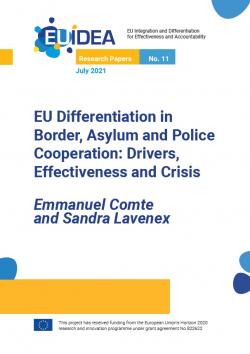EU Differentiation in Border, Asylum and Police Cooperation: Drivers, Effectiveness and Crisis
The leading policy objective in EU differentiation underlying border, asylum and police cooperation has been to achieve the abolition of internal border controls to create a borderless European single market. Germany has been the main proponent kickstarting and maintaining such agenda through differentiation. For roughly two decades, differentiation has proved effective to abolish internal border controls, integrate the related cooperation in EU structures, enlist the cooperation of non-EU member states, and produce joint policy outputs on asylum, external borders and police affairs. Yet, growing external migration challenges have undermined the effectiveness and legitimacy of existing arrangements, ushering in disintegration tendencies.
-
Details
Rome, IAI, July 2021, 25 p. -
In:
-
Issue
Research Paper 11
Introduction
1. Triggers of differentiation
2. Governance of differentiation
2.1 Standards and legal instruments
2.2 Opt-outs
2.3 External differentiation
3. Effectiveness and legitimacy of differentiation
3.1 De-differentiation and policy outputs
3.2 Integration stalemate and legitimacy crisis
Conclusion
References



